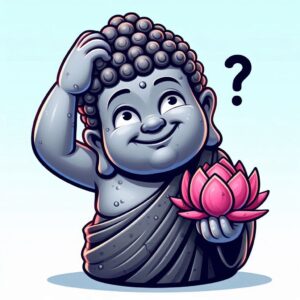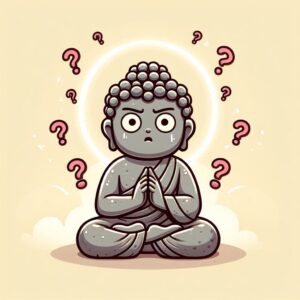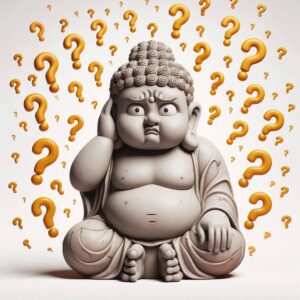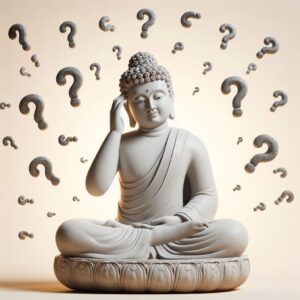知らぬが仏とは?
「知らぬが仏(しらぬがほとけ)」 とは、何か不快な事実や嫌な真実を知らない方が、心穏やかでいられることを指すことわざです。この表現は、無知であることが必ずしも悪いことではなく、逆に幸福につながる場合があるという皮肉を込めています。
「仏」は、安らかで穏やかな心を持つ存在の象徴です。
このことわざでは、「知らない」ことによって、人が平穏でいられる様子を「仏」に例えています。
何かを知ってしまうことで心が乱れたり、苦しんだりすることが多いですが、あえて知らなければそのような感情を抱かずに済むという意味です。
例えば、悪口や裏切りの事実を知らない方が、平穏な気持ちでいられるという状況に当てはまります。
用例とニュアンス
用例
「彼が自分の悪口を言っていたなんて知らなかったけど、知らぬが仏だね。」:知らない方が気楽で良かったというニュアンス。
「部長が本当はあのプロジェクトで大きなミスをしていたと知ったが、社員は気づいていない。知らぬが仏だろう。」:知らない方が余計な混乱や問題を避けられる場合。
ニュアンス
ポジティブ:知らないことで平穏を保つことを肯定的に捉える場合。
ネガティブ:知らないことが原因で、現実を直視しない無責任さや鈍感さを批判的に捉える場合。
ことわざが使われる場面
「知らぬが仏」が使われるのは、主に以下のような場面です:
個人の感情を守るため
嫌な事実を知ることで苦しむよりも、知らない方が幸せでいられる場合。
例:友人が陰で批判していたと知ればショックだが、知らない方がその関係を良好に保てる。
他人を思いやる場合
あえて事実を伏せることで、その人の心を守る場合。
例:高齢の親に、家族のトラブルを知らせないことで安心させる。
無知を肯定する皮肉な場合
知らないことによる問題点や愚かさを指摘する場合。
例:社会問題に無関心な人を批判的に指すとき。
関連する心理
「知らぬが仏」という態度を取る背景には、以下のような心理が働いていることがあります。
恐怖回避の心理
知らない方が、精神的な負担を避けられるという考え。
幸福を優先する心理
悪い知らせや問題を知ることで、現在の幸福感が損なわれることを嫌う気持ち。
保身の心理
あえて事実を確認しないことで、自分の責任や関与を回避したい心理。
類義語と対義語
類義語
「無知は幸せ」:知らないことが、心の平穏や幸福を保つ理由になるという意味で近い表現。
「知らない方がいい」:知ることで生じる問題や苦しみを避けるために使われる。
対義語
「事実は力なり」:真実を知ることが、人間の力や成長につながるという考え。
「知るは力」:知識を持つことが、人を強くするという積極的な価値観。
「知らぬが仏」がもたらす影響
ポジティブな影響
「精神の安定」:不快な真実を知る必要がないため、ストレスを避けられる。
「人間関係の維持」:相手の欠点や悪意を知らないことで、関係が悪化するのを防げる。
ネガティブな影響
「現実逃避」:問題を知らないふりをすることで、解決が遅れる。
「無責任な態度」:事実を知ろうとしないことで、他人に迷惑をかける可能性。
現代的な視点での「知らぬが仏」
現代社会では、インターネットやSNSの普及によって、情報を知ることが簡単になりました。そのため、「知らぬが仏」の価値が再評価されることもあります。
情報過多の時代
多くの情報に触れることで、不安や混乱を招く場合があります。
例:ニュースや炎上案件など、直接関係のない情報を知ることでストレスを感じる。
あえて「知らない」を選ぶ
必要以上に情報を追わないことで、心の平穏を保つライフスタイル。
例:スマホやニュースのチェックを控える「デジタルデトックス」。
「知らぬが仏」は、一見すると無責任な態度のように思えますが、状況によっては心を守る賢明な選択にもなり得ます。ただし、長期的な視点では、知らないことで解決が遅れたり、周囲に悪影響を与えることもあります。
知るべきことと知る必要のないことを見極める力を持つことが、現代においては特に重要です。このことわざは、何を知るべきかを考えるきっかけとなる表現でもあります。
Shiranuga-hotoke” is a proverb meaning that it is better to be at peace if one does not know some unpleasant fact or unpleasant truth. The irony of this expression is that ignorance is not necessarily a bad thing; on the contrary, it can lead to happiness.
The word “Buddha” symbolizes a being of peace and serenity.
In this proverb, “not knowing” is compared to “Buddha” in how one can be at peace.It means that knowing something often causes the mind to be disturbed or suffer, but if one dares not to know, he or she will not have such feelings.
For example, it applies to a situation in which a person would feel more at peace if he or she did not know about a bad word or a betrayal.Examples and nuances
Example of usage
I didn’t know he was bad-mouthing me, but I guess ignorance is bliss. Nuance: It would have been better to be comfortable not knowing.
I found out that the manager really made a big mistake on that project, but the employees are unaware of it. I guess it’s better not to know. The nuance is that it would have been better to avoid unnecessary confusion and problems if they did not know.Nuance
Positive: When not knowing is a positive way to maintain peace.
Negative: When ignorance is taken critically as irresponsibility or insensitivity to face reality.Situations where the proverb is used
The proverb “Ignorance is bliss” is mainly used in the following situationsTo protect personal feelings
When it is better to be happy not to know than to suffer from the knowledge of an unpleasant fact.
Example: It would be shocking to learn that a friend has been criticizing you behind your back, but you would be better off if you did not know.When you are considerate of others
When you dare to protect a person’s feelings by withholding the facts.
Example: Reassuring an elderly parent by not letting him or her know about family troubles.When it is ironic to affirm ignorance
When pointing out the problems and foolishness caused by ignorance.
Example: When referring critically to someone who is indifferent to social issues.Related psychology
The following psychology may be at work behind the “Ignorance is bliss” attitude.Psychology of fear avoidance
The idea that one can avoid the mental burden of not knowing.The psychology of prioritizing happiness
The feeling of not wanting to have one’s current sense of well-being compromised by learning of bad news or problems.Psychology of self-preservation
The psychology of wanting to avoid one’s own responsibility or involvement by daring not to confirm the facts.Synonyms and Synonyms
Synonyms
Ignorance is bliss”: a similar expression in the sense that ignorance is a reason to maintain peace of mind and happiness.
I prefer not to know”: used to avoid problems and suffering caused by knowing.Synonyms
Fact is power: the idea that knowing the truth leads to human strength and growth.
Knowing is power”: a positive value that knowledge makes one stronger.The Impact of “Ignorance is bliss
Positive Influences
Mental stability: avoiding stress by not having to know uncomfortable truths.
Relationship Preservation: By not knowing the faults and ill will of others, one can prevent relationships from deteriorating.Negative Influence
Avoidance of reality: Pretending ignorance of a problem delays its resolution.
Irresponsible attitude”: not trying to know the facts, which may cause problems for others.The “ignorance of the facts” from a modern perspective
In today’s society, the Internet and social networking services have made it easier to know information. As a result, the value of “unknowing is but a Buddha” is sometimes re-evaluated.The Age of Information Overload
Exposure to a lot of information can cause anxiety and confusion.
Example: Stress caused by knowing information that is not directly related to the news, inflammatory cases, etc.Dare to choose “I don’t know.
A lifestyle that maintains peace of mind by not following more information than necessary.
Example: A “digital detox” in which one refrains from checking one’s phone and news.At first glance, “Ignorance is bliss” may seem like an irresponsible attitude, but in some situations it can be a wise choice to protect your mind. However, from a long-term perspective, not knowing can delay resolution or have a negative impact on those around us.
Having the ability to discern what we need to know and what we do not need to know is especially important today. This proverb is also an expression that can help us think about what we need to know.
AIが描いた「知らぬが仏」







コメント